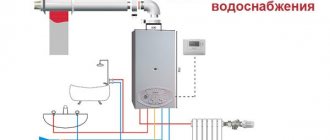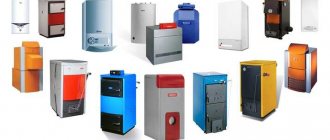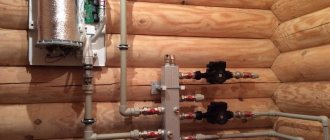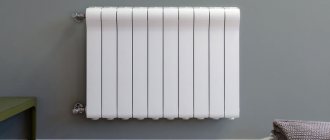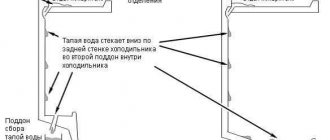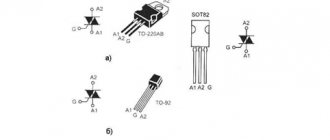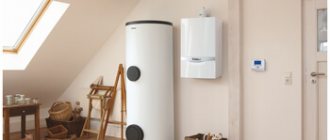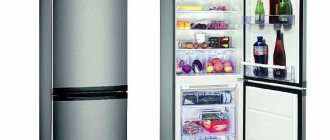Home / Gas boilers
Back
Published: 06/12/2019
Reading time: 4 min
0
1383
Over the past 30 years, the market price of gas fuel has been constantly growing. Economists explain this trend by two factors. The first is inflation caused by a decrease in the purchasing power of the dollar; since 1975 it has fallen almost 4 times.
The second is the growth of the world population, which over the same period increased from 4.4 billion to 7.2 billion people. At the same time, there are no more energy resources themselves, but on the contrary, there are fewer and fewer of them.
In an era of high gas tariffs, people are not willing to pay a lot for gas fuel for individual heating and therefore they are looking for the most economical gas heating boiler in the retail chain.
There are many types of boilers
A prudent owner will try to figure out on his own which gas boiler is the most economical and reliable, so as not to fall for the trick of dishonest sellers who need to sell stale equipment.
- 1 What affects the efficiency of the boiler
- 2 Rating of the most economical gas boilers
Wood-burning, economical boilers for home heating
Since the price of heating increases every year, people began to seriously think about the possibility of using alternative heating methods.
Economical wood-burning boilers for heating a private home today have taken a leading position in the heating appliance market, because such boilers produce a large amount of heat with minimal use of wood.
Wood is not the only fuel.
Boilers using solid fuel operate not only on wood, but also on peat briquettes, coke, hard or brown coal.
An economical long-burning boiler has many advantages:
- High level of efficiency;
- Complete independence of the boiler from external communications;
- Inexpensive fuel (compared to gas);
- Possibility to choose fuel.
Features of closed type burners
Such combustion chambers are installed in turbocharged heat generators; they, in combination with a forced air supply system, create excellent conditions for gas combustion. The operating principle of such burners is significantly different from the previous one. There are two types in total:
- Modulation burners.
- Two- or multi-stage.
The first type changes the combustion intensity during operation, and the second changes the power. The automation system independently controls the burner, reading data about the thermal load on the system. The efficiency of such boilers reaches 92%. Plus, the closed combustion chamber allows you to get rid of the traditional chimney and install a coaxial pipe.
Which gas boiler is better to choose?
This section is intended to tie all previous discussions to real life, because theory and practice are different things. Theoretically, everything is correct; the most economical gas boiler with the highest efficiency is a condensing boiler. But having learned how much this miracle of technology costs, not everyone will dare to buy it. And is there such a need?
Take the same gravity system, which does not require pumps, automation and electricity. It is not advisable to buy an expensive heat source for it, although a turbocharged or condensing heat generator will cope well with such a system. It will simply force the coolant to circulate forcibly from its own pump. The question is the reliability of power supply and the decent price of equipment, which will pay off when it is unknown.
It is also not very reasonable to buy a condensing boiler for a small house of 100 square meters. m of area with any heating system. In such an area, you are unlikely to feel the efficiency compared to an inexpensive aspirated engine. You can see a real difference if a country cottage with an area of over 300 square meters. First, heat it with a simple boiler, and then change it to a condensing boiler.
The principle of boiler efficiency
Ideally, a heating boiler must first effectively burn liquefied or natural gas, and then redirect the resulting heat to heat the coolant. But in reality, everything does not always go so smoothly, and for these reasons:
- To effectively burn fuel and obtain maximum thermal energy, it is necessary to mix gas and oxygen in a precise ratio (approximately 1:10). Not every heating device can do this.
- During the fuel combustion reaction, carbon dioxide and water are formed, which immediately begins to evaporate, taking away part of the thermal energy.
- Heated combustion products by their nature cannot completely transfer energy to the heat carrier; a certain part of it still leaves through the chimney. This value will depend on the design of the boiler equipment.
Thus, one part of the energy contained in the fuel is lost during the combustion stage, and the second part is lost during thermal transfer. The lower these losses, the more productively energy is consumed and the more economical the gas boiler is. The operating efficiency of a heating device is expressed in its efficiency, which is indicated in the manufacturer's instructions. The higher this characteristic, the more thermal energy is directed to heating the coolant and the gas is burned more economically.
The efficiency of modern gas equipment depends on the design of the boiler and is in the range of 80−95%. The more inflated power ratings indicated by manufacturers of heating appliances do not correspond to reality.
